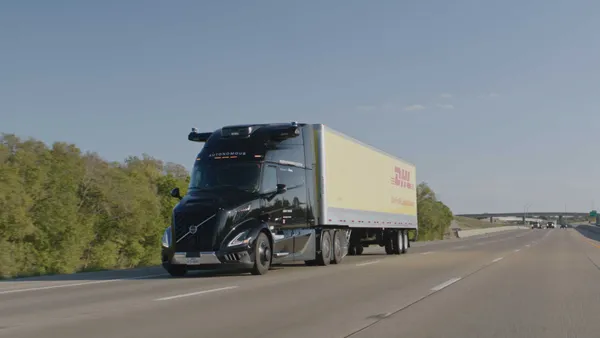As a growing asset-based carrier in 2024, having an efficient truck dispatch system in place is more critical than ever for managing your expanding fleet, optimizing complex operations and winning the most profitable loads – particularly dedicated lanes. With the right technology solution powering your workflow, you can scale smarter, faster.
However, with many options on the market all touting robust features, it can be challenging to determine the best fit for your unique operational needs and growth trajectory. Not all software platforms are created equal.
In this guide, we cut through the noise to reveal the top five trucking dispatch software solutions this year based on core functionality, fleet size and key pain points you may be solving for. Whether you are an emerging carrier or an established fleet looking to upgrade, we detail the stand-out providers poised to become industry-leaders into the future.
Truckbase: the truck dispatch software leader for 10-100 truck fleets
Launched in 2021, Truckbase was built from the ground up with small-to-medium asset-based carriers in mind. For a robust system, it is remarkably easy to learn and use and thus requires minimal training for dispatchers and drivers alike. As a result, you can spend more time serving customers than figuring out how to use your software.
Truckbase’s software revolves around three core feature sets: dispatching, invoicing and driver settlements. With respect to dispatching, its AI-powered load importer massively reduces – if not outright eliminates – manual data entry to get a load into the system, sent to a driver and delivered to a customer. Moreover, data entry automation tends to reduce potentially costly human errors as well.
For fleets in the 100-truck range that might have more dedicated lanes and sophisticated customer requirements can leverage Truckbase’s ELD integrations, EDI connections, truck-level profitability analysis tools and customizable driver pay functionality to streamline operations.
Thus if you’re a small-to-medium sized growing fleet that’s looking to modernize, professionalize and improve your operational efficiency, Truckbase is a great answer.
McLeod: Highly customizable and feature-rich for the largest fleets
Dating back to 1992, McLeod boasts a 30+ year history and offers the most robust TMS software on the market. Name a feature, and they probably have it. Its highly customizable nature allows fleets to tailor the software to their specific needs. However, extensive customization comes with a cost – far longer and more involved implementation process, with correspondingly high prices. McLeod is best suited for larger fleets with 100+ trucks that are prepared to treat their software selection process as a real investment. While their software may feel slightly dated, it remains a top choice for mega carriers due to its comprehensive feature set and high level of customization.
TruckingOffice: Low-cost solution for owner operators
TruckingOffice caters to owner operators and small fleets with 1-5 trucks. It is an affordable option with limited functionality, making it suitable for record keeping at home but less ideal for dispatch because it lacks driver functionality. The software is best for a single user, such as one owner who manages both dispatching and accounting, as collaboration features are limited. TruckingOffice is also a good option for owner operators that only work with a handful of brokers or shippers, as they do not offer a load board. Last, if users are willing to invest the time in weekly data entry, it offers good detailed cost tracking and reporting capabilities.
ITS Dispatch: Ideal for small fleets with a brokerage
Similar to TruckingOffice, ITS Dispatch targets small operators with 1-5 trucks. If you have a brokerage arm, ITS Dispatch offers an advantage over TruckingOffice as it includes a module specifically designed for brokerages, as well as some load board functionality. While ITS Dispatch serves its purpose well for the smallest fleets, it may not meet the needs of fleets looking to grow or those requiring more advanced collaboration features like driver apps, live tracking, or mobile scanning.
Google Sheets: The free and basic option
For those just getting started or with limited budgets, Google Sheets can serve as a basic dispatch solution. As a free option, it is best suited for tech-savvy users who can build custom TMS functionality within the spreadsheet framework. However, Google Sheets has limitations in terms of collaboration and lacks the advanced features offered by dedicated dispatch software providers.
Conclusion
The choice of trucking dispatch software depends on various factors such as fleet size, budget and desired functionality. For growing asset-based carriers with 1-100 trucks looking for a modern cloud-based software solution, Truckbase is a top-tier option. McLeod offers an extensive feature set for the largest fleets but requires a far more involved implementation process. Trucking Office, ITS Dispatch and Google Sheets cater to owner operators and smaller fleets with varying levels of functionality and limitations for those looking for free or low cost options. Consider your unique business type and requirements to select the dispatch software provider that best suits your trucking operation in 2023.
Trucking dispatch software FAQs
What is truck dispatch software and how can it benefit my trucking business?
Truck dispatch software is a type of transportation management system (TMS) specifically designed to streamline the scheduling and routing of trucks and shipments. It benefits your trucking business by optimizing dispatch operations, improving route efficiency, reducing paperwork, enhancing communication with drivers and providing real-time tracking of shipments and vehicles.
Can trucking dispatch software integrate with other systems like accounting or GPS tracking?
Yes, most modern trucking dispatch software can integrate with a variety of other systems, including accounting software like QuickBooks and electronic logging devices (ELD). These integrations enable a seamless flow of information across different business functions, enhancing overall operational efficiency.
Is trucking dispatch software suitable for small to mid-sized fleets?
Absolutely. Truck dispatch software is designed to cater to the needs of trucking companies of all sizes, including small to mid-sized carriers. It can be particularly beneficial for these companies by helping to manage loads more efficiently, reducing manual tasks and allowing for scalable growth without necessarily increasing office staff.
How does trucking dispatch software improve driver communication and management?
Dispatch software typically includes features such as mobile apps for drivers, real-time communication tools and automated notifications. These features allow for instant dispatching of load information, real-time tracking of driver locations and easier submission of delivery documentation, thereby improving overall communication and management of drivers.
Can dispatch software help in compliance with regulatory requirements?
Yes, dispatch software often includes features that help in maintaining compliance with various regulatory requirements such as Hours of Service (HOS), International Fuel Tax Agreement (IFTA) reporting and driver vehicle inspection reports. This helps in reducing the risk of non-compliance penalties.
What should I consider when choosing dispatch software for my trucking business?
When choosing dispatch software, consider factors like ease of use, customization options, integration capabilities with existing systems, mobile accessibility, customer support and pricing. Also, look for software that aligns with the specific needs and size of your business.
Are there any training and support services available for dispatch software?
Most dispatch software providers offer training and support services to help you and your team understand and effectively use their software. This can include online tutorials, webinars, customer support lines and in some cases, personalized training sessions, which Truckbase provides.










